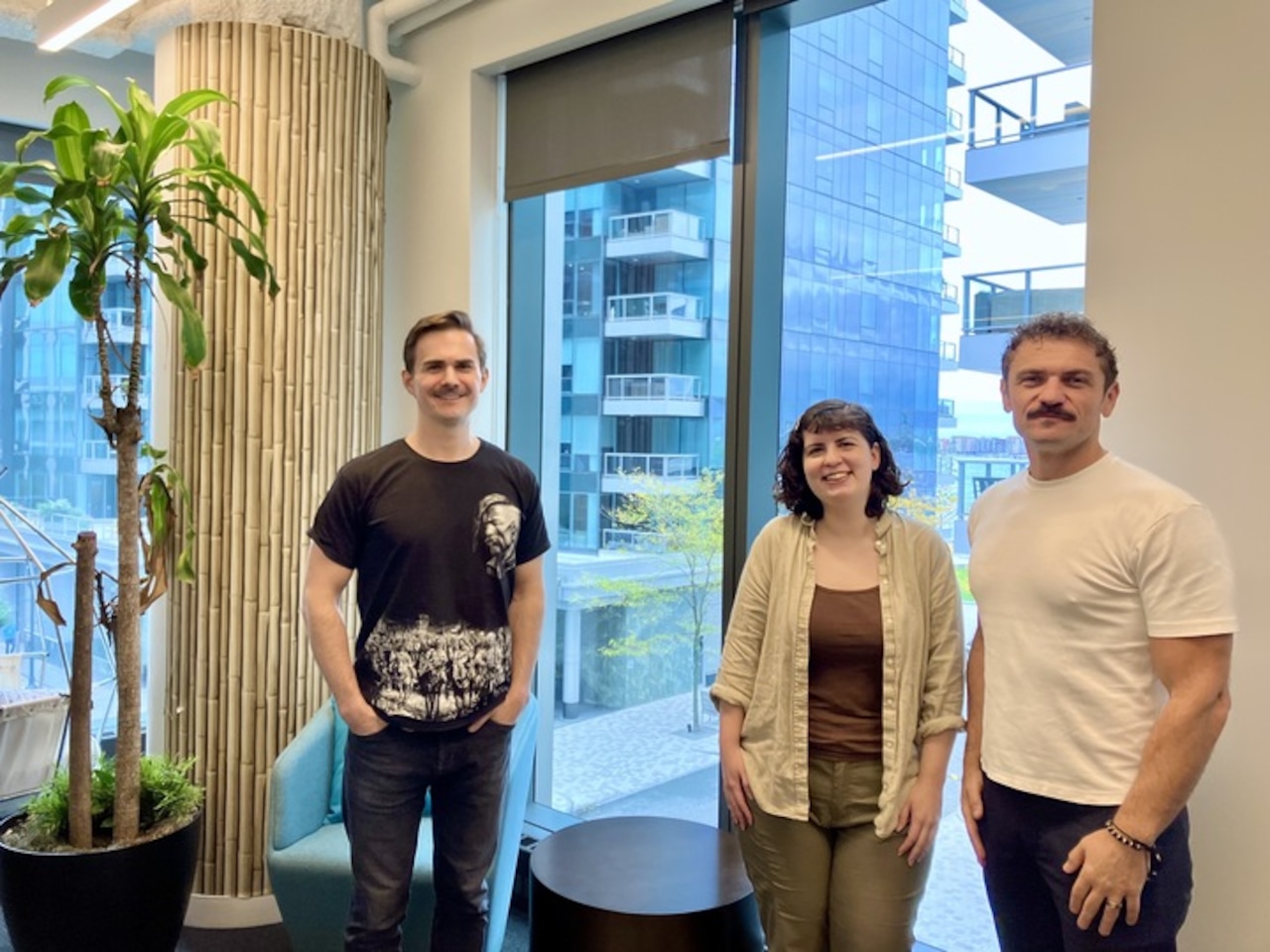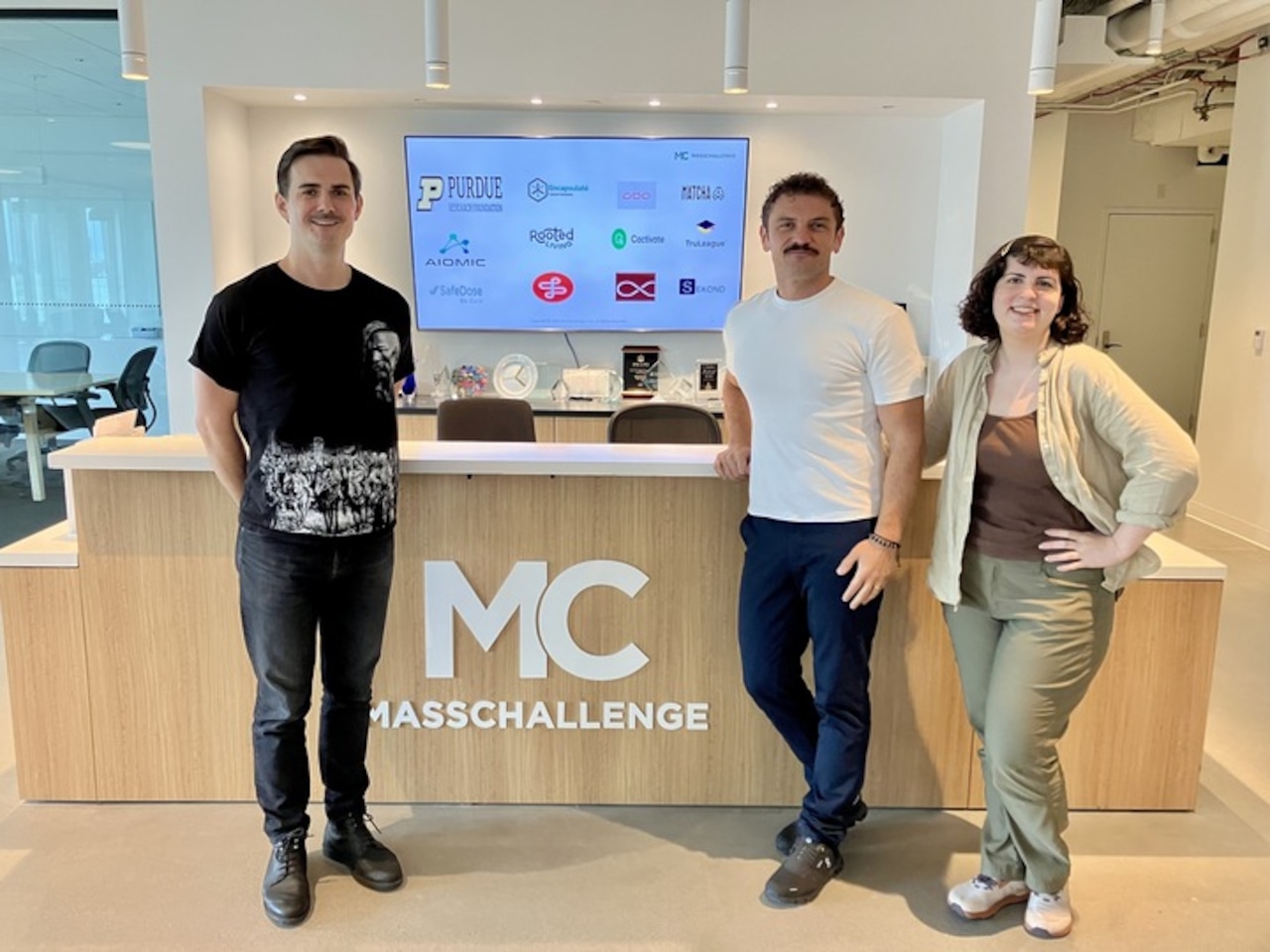Its founders call it a Google search or ChatGPT for DNA. In essence, users can ask their genetics direct questions.
Why am I not responding well to my medication?
Why do I have high testosterone?
Why do I have recurring cases of gout?
But instead of receiving broad, sometimes unnecessarily disconcerting information from a website like WebMD — potential diagnoses ranging from a common cold to cancer — the platform generates answers based precisely on the user’s genetics.
This is Bystro, an artificial intelligence genomics research assistant being honed in the Boston Seaport space of MassChallenge, a nonprofit that aims to support and accelerate entrepreneurship.
The AI startup combines elements of Ancestry.com, search engines and primary health care into comprehensible takeaways for researchers, doctors and individuals. It joins a growing proliferation of services that provide direct-to-consumer genetics — from ancestral roots to dog DNA kits to health screenings.
Read more: How a Boston AI start-up is changing the way MLB teams value pitchers
Artificial intelligence is already on its way to reshaping health care internationally, though not without concerns. In May, a Research Insights report estimated the global market was valued at $26.6 billion in 2024 and could reach $187.7 billion by 2030, a growth of 38%.
Bystro has the ability to translate DNA ranging from just one person to a dataset of hundreds of thousands of individuals. If it reaches its full potential, one of its co-founders thinks it could “change precision medicine worldwide.”
“We’re giving people Broad-level research access,” said Bystro CEO and co-founder Alex Kotlar, referring to the Broad Institute, a Cambridge-based world-renowned biomedical and genomic research center affiliated with the Massachusetts Institute of Technology and Harvard University.
The brains behind Bystro
Kotlar’s interest in health and genetics dates back to the earliest years of his life, as an immigrant from Ukraine whose family fled the 1986 Chernobyl nuclear disaster. Family members grew increasingly sick with cancer in the years that followed, and several ultimately passed away within six months of each other.
Direct connections between their deaths and Chernobyl were never established, but still inferred. Kotlar was raised being told he had a 50% increased risk of developing cancer during his lifetime.
After grappling with his own health issues in his early 20s, Kotlar, 39, decided to enter a pre-med program and ultimately pursued a Ph.D. in genetics at Emory University. That’s where the seeds for Bystro were sown.
“I had this idea to make a Google-like search engine for genetics,” Kotlar said. “I saw what Google was able to do: index the world’s information and make it so that I could ask a question and get a reasonable answer. And I thought, well, I could just do that for genetics.”
Read more: Walmart makes revolutionary change to how you shop, launches OpenAI partnership
He met one of his fellow co-founders, Cristina Trevino, 35, at Emory, where she, too, was studying genetics. She was instantly drawn to the Bystro pitch.
“I was like, ‘Everybody should be using this,’” Trevino said. “I want genetics to be accessible for everybody. It shouldn’t be locked behind all of this software that’s just really hard to use. It’s poorly maintained in academia, and it’s really a huge struggle to get anyone up to the level of a technical expert in the field.”
Completing the Bystro trio, co-founder Mason Alban, 38, entered the picture from an unlikely place. He was an actor who had studied at Emerson College, achieving roles in several major plays, movies and TV shows.
On the side, he was always looking for interesting startup endeavors, and his own health challenges made him particularly intrigued by Kotlar’s developing project when they crossed paths at a party years ago.
Battling long-standing lethargy, fatigue, gout and hearing loss, Alban had gone to doctors across Boston and was still bereft of concrete answers. When he ran his DNA through Bystro, he was “blown away.”
Alban explained that Bystro conveyed he had specific gene variants that contributed to his hearing loss, as well as another variant that affected his response to the gout medication he’d been prescribed.
He also learned, for the first time in his life, he was lactose intolerant. When he cut out dairy, he felt better than ever.
The company’s goal, Alban said, “is to give everyone agency over their health.”
Thomas Wingo, involved in the early stages of inception and still Bystro’s chief scientific officer, is an associate director at the University of California, Davis Alzheimer’s Disease Research Center.
 Bystro, an AI ‘direct consumer genetics’ platform, is a startup company led by, from left, Alex Kotlar, Cristina Trevino and Mason Alban. They work out of the MassChallenge space in Boston’s Seaport.Hadley BarndollarHow ‘ChatGPT for genetics’ works
Bystro, an AI ‘direct consumer genetics’ platform, is a startup company led by, from left, Alex Kotlar, Cristina Trevino and Mason Alban. They work out of the MassChallenge space in Boston’s Seaport.Hadley BarndollarHow ‘ChatGPT for genetics’ works
A “ChatGPT for genetics,” as Kotlar dubs it, Bystro analyzes complex genetic data — likely inaccessible to anyone without an advanced genetics education — and then provides insights in plain English based on user prompts.
It enables people to ask sequences of questions about a set of DNA and, in turn, receive specific answers regarding genetic observations, potential diagnoses, risk prediction, medications, ancestry and more.
“A person doesn’t come with an instruction manual,” Kotlar said. “Everybody’s unique. And so if you’re actually doing tailored therapies and tailored diagnosis, you have to be able to respond dynamically to that person’s unique profile.”
Still in its early launch stages, their goal is to see the Bystro platform offered to researchers and universities, doctors and then individual users. The team is already contracting with Emory, UC Davis and the Inflammatory Bowel Disease Genetics Consortium.
Read more: Is Massachusetts keeping pace with the AI technology race?
Kotlar, Alban and Trevino want to see doctors consulting Bystro as a research assistant and, ultimately, people using the platform from the comfort of their home after sending in a DNA sample to be processed and uploaded to the platform.
“We want everyone to be able to use genetic data on their own,” Trevino said. “There’s so much you can do with it. As a geneticist, there is so much information I wish I could tell people deeply, and Bystro is able to do that.”
Importantly, every response generated by Bystro comes with a disclaimer: the findings should be reviewed with a physician or clinical pharmacist who has expertise. They should not be used to self-diagnose and self-medicate.
“You should absolutely talk to your physician about this,” Kotlar said. “(Bystro) is a personal research tool.”
AI explosion in health care
Massachusetts is working to bill itself as a national artificial intelligence hub. And given the state’s top health systems, a marriage between the emerging technology and medicine is perhaps inevitable.
AI is increasingly being used in hospital settings, from interpreting results to drafting patient notes to analyzing scans. Mass General Brigham, for example, is using AI for 15,000 patients currently without a primary care doctor — an app questions patients, reviews medical records and produces a list of potential diagnoses, according to recent reporting by the Boston Globe.
This year, Israel’s Sheba Medical Center — one of the top medical centers in the world — announced it is expanding into Boston in 2026 with its AI health care startup incubator, aiming to introduce international companies with cutting-edge developments into the U.S. market.
But AI’s rise in health care hasn’t come without controversy — particularly debates over ethics, potential inaccuracies and data privacy concerns. Some worry AI will eventually be used to replace the expertise and personal touch of human medical professionals, diminishing the patient-provider relationship.
Read more: Mass. patients will be first in US to access these revolutionary AI health care technologiesCan Bystro keep the DNA private?
Kotlar said he has his ethics speech ready for skeptics. Mainly, it leads with, “I didn’t come to this thinking AI and health care is an awesome idea.”
Rather, he wanted to see how far he could take natural language processing — a branch of AI that enables computers to comprehend, interpret and generate human language.
Just like with all AI platforms, there are concerns that Bystro might share the wrong information with users and make mistakes. Kotlar argued the same can be said for humans, who are also not “fully deterministic machines.”
Bystro is also launching in the shadows of the 23andMe bankruptcy case earlier this year that followed a data breach, related lawsuits and struggling sales. As a result of the bankruptcy, a trove of genetic data on millions of people was essentially put on the market for the highest bidder.
People are concerned about privacy in the age of AI — medical data is highly sensitive, and data breaches are becoming increasingly common. DNA specifically is attractive to hackers for exploitation because it is profitable and unchangeable, unlike passwords or credit card numbers, for example.
Kotlar acknowledges those concerns. He said Bystro doesn’t hold onto the genetic data that fuels the platform’s findings.
“It gets deleted right away,” he said. “It gets transformed into the way that Bystro needs it and then gets discarded. And the dataset that’s there is your dataset. It’s like you’ve uploaded something to Google Drive, and you can just delete it.”
It can certainly be tempting for companies to hold onto genetic data for research purposes. But AI platforms, by and large, don’t have a secure way to store DNA information on their servers yet, Kotlar said.
“We won’t do that unless we have a safe way to do it.”
If you purchase a product or register for an account through a link on our site, we may receive compensation. By using this site, you consent to our User Agreement and agree that your clicks, interactions, and personal information may be collected, recorded, and/or stored by us and social media and other third-party partners in accordance with our Privacy Policy.

